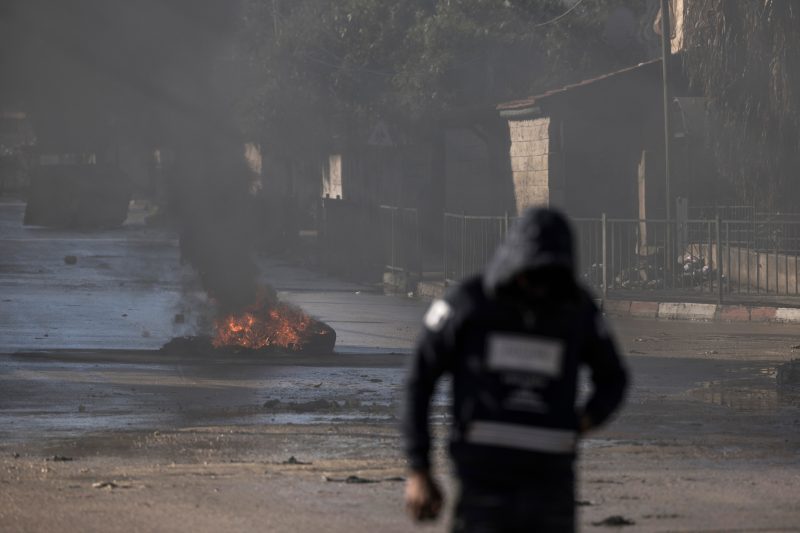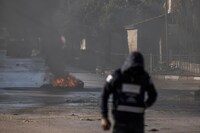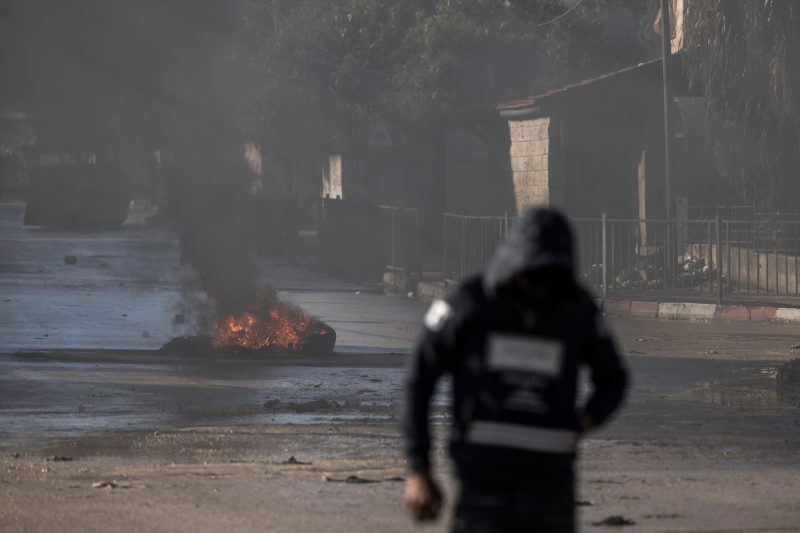

President Biden signed an executive order Thursday that imposes sanctions on four West Bank settlers who the administration says have committed violence against Palestinians, marking the most significant action he has taken against Israelis since their country launched a war in Gaza.
The executive order mirrors sanctions imposed on individuals designated as terrorists, two senior administration officials told reporters on Thursday. It will block the settlers from accessing any property or assets held in the United States and prevent them from receiving any funds, goods or services that pass through the American financial system.
The settlers also will not be allowed to send money to the United States or have anyone act on their behalf, the officials said.
The State Department said each of the individuals sanctioned is responsible for unacceptable acts of violence in the West Bank, a Palestinian territory that, unlike Gaza, is home to numerous controversial — and in many cases illegal — Israeli settlements.
David Chai Chasdai, according to State, led a riot that included setting cars and buildings on fire, assaulting Palestinian civilians and causing property damage that led to the death of a Palestinian civilian.
Einan Tanjil attacked Palestinian farmers and Israeli peace activists with stones and clubs, resulting in injuries that required medical treatment, the State Department said.
Shalom Zicherman assaulted Israeli activists in the West Bank and attempted to break the windows of passing cars with activists inside. Zicherman also cornered at least two activists and injured them both, according to State.
And Yinon Levi led a group of settlers who created “an atmosphere of fear in the West Bank,” according to State, threatening Palestinian and Bedouin civilians with violence if they did not leave their homes. Levi also burned their fields and destroyed their property.
The sanctions came on a day that Biden was visiting Michigan, home to one of the largest Muslim and Arab American communities in the United States, where he was expected to face protesters angry about his unwavering support for Israel and its military campaign in Gaza.
The office of Israeli Prime Minister Benjamin Netanyahu, whose governing coalition includes right-wing representatives of the settler movement, issued a statement arguing that Biden’s executive order was unnecessary.
“The absolute majority of the settlers in Judea and Samaria are law-abiding citizens, many of whom are currently fighting regularly and in the reserves for the defense of Israel,” the statement said, using Israel’s name for the West Bank. “Israel acts against all lawbreakers everywhere, so there is no room for exceptional measures in this regard.”
Sen. Ben Cardin (D-Md.), who chairs the Senate Foreign Relations Committee, said the executive order sends a “strong message against the extreme activities taken by some settlers in the West Bank.”
Israel’s West Bank settlements are considered illegal under international law. That position was also held by the United States for decades, until the Trump administration in 2019 declared that the U.S. government does not necessarily consider Israeli settlements illegal.
Tens of thousands of U.S. citizens are estimated to live in West Bank settlements. Cardin said Thursday that he has asked the administration to take legal action against U.S. citizens involved in settler violence, in addition to the sanctions and visa restrictions placed on Israeli nationals.
Officials said the sanctions flow from instructions that White House national security adviser Jake Sullivan issued to Cabinet members in November ordering “departments and agencies to take appropriate action and to develop policy options for further action against actors responsible for this conduct and violence in the West Bank.”
In early December, the State Department said it would restrict U.S. visas for Israelis and others believed to be involved in settler violence. Neither those restrictions nor the newly announced sanctions affect the many West Bank settlers who are also U.S. citizens.
Tensions have erupted across the Middle East since Hamas militants surged through Israel’s border fence with Gaza on Oct. 7, and killed 1,200 Israelis, terrorizing them and taking some 250 hostage. In response, Israel launched a scorched-earth military campaign against Hamas in Gaza that has resulted in the death of more than 27,000 Palestinians, according to the Gaza health ministry.
National Security Council spokesman John Kirby said Thursday that the timing of the sanctions announcement was not tied to increased domestic pressure on Biden to take stronger action. Saying that “it takes time” to organize and approve such measures, Kirby said that it was “a direct answer to the dramatic increase in settler violence that we’ve seen by settlers on Palestinians in the West Bank since the 7th of October.”
The president has raised the issue in almost every call with Netanyahu, according to one of the senior officials.
Jewish settlers have attacked and killed Palestinians in hopes of driving them out of their communities, activists and experts say, using such tactics as burning property, tearing up land and destroying olive trees, which are a primary source of income for many Palestinians.
U.S. officials believe that two right-wing members of Israel’s cabinet who come from the settler movement — Finance Minister Bezalel Smotrich and National Security Minister Itamar Ben Gvir — are particular obstacles to curtailing the violence.
Still, one of the administration officials said the United States is not considering sanctions against Smotrich or Ben-Gvir themselves.
In the text of his executive order, Biden said the settler violence in the West Bank “has reached intolerable levels” and that the attacks “constitute an unusual and extraordinary threat to the national security and foreign policy of the United States.”
The attacks, it adds, “undermine the foreign policy objectives of the United States, including the viability of a two-state solution. They also undermine the security of Israel and have the potential to lead to broader regional destabilization across the Middle East, threatening United States personnel and interests.”
Biden’s decision to highlight a two-state solution in his order comes as Netanyahu is harshly dismissive of any such proposal, saying a Palestinian state would only become a staging ground for more violence.
Even before the Oct. 7 Hamas attacks, the West Bank had recorded its deadliest year to date, and the attacks have increased markedly since then.
Between Oct. 7 and Jan. 31, 370 Palestinians — 94 of them children — were killed across the West Bank, including East Jerusalem, according to the United Nations Office for the Coordination of Humanitarian Affairs. Among the dead were 360 people killed by Israeli forces, eight by settlers and two by people whose identity was unclear.
Additionally, at least 198 Palestinian households comprising 1,208 people have been displaced.
The Biden administration has long been concerned that this combustible situation could escalate into another front in the Israel-Gaza war. Biden has tightly embraced Israel since Oct. 7, even as its punishing military campaign — which has created a humanitarian catastrophe and put Gaza’s more than 2 million residents at risk of starvation and disease — has increasingly prompted international condemnation.

